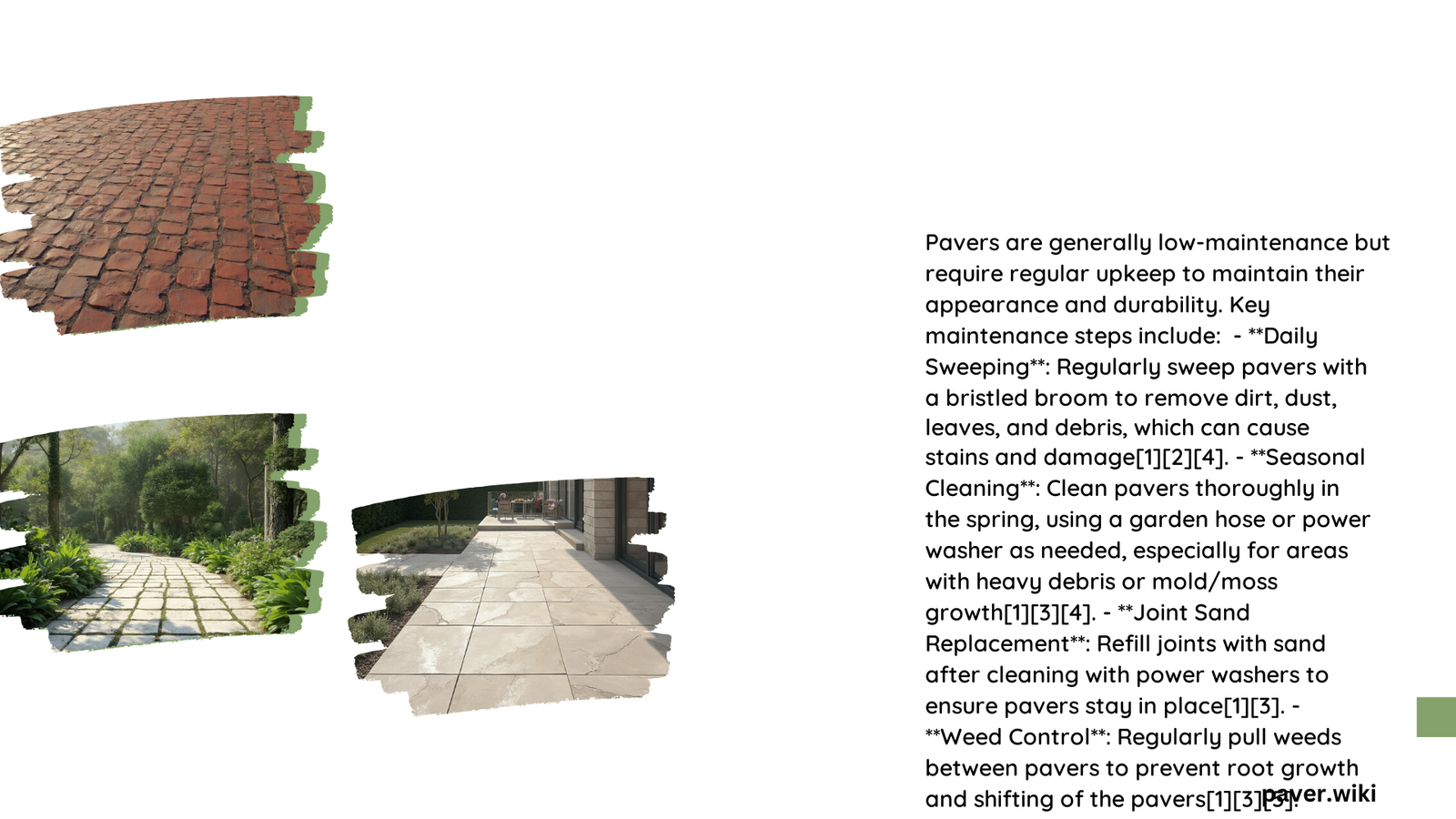Pavers are a popular choice for outdoor surfaces due to their aesthetic appeal and durability. However, many homeowners wonder if pavers are hard to maintain. While pavers do require regular care, the level of maintenance is generally manageable with proper knowledge and techniques. This guide will explore the challenges, maintenance tasks, and best practices for keeping your pavers in top condition.
What Are the Main Maintenance Challenges for Pavers?
Pavers face several maintenance challenges that homeowners should be aware of:
- Weed and moss growth between pavers
- Breakdown of sand in joints
- Staining and color fading
- Cracks and chips in individual pavers
These issues can affect the appearance and stability of your paver installation if not addressed promptly.
How Often Do Pavers Need Maintenance?

The frequency of paver maintenance tasks varies:
- Sweeping and cleaning: Weekly or bi-weekly
- Deep cleaning with pressure washer: Every 6-12 months
- Weed control: Every few weeks during growing seasons
- Stain removal: As needed, ideally within 1-2 days of occurrence
Regular maintenance helps prevent more significant problems and keeps your pavers looking their best.
What Are the Most Effective Cleaning Methods for Pavers?
To keep your pavers clean and well-maintained, consider these methods:
- Sweeping: Use a broom or leaf blower to remove debris weekly.
- Pressure washing: Deep clean every 6-12 months, adjusting pressure to avoid damage.
- Chemical cleaners: Use for tough stains, but avoid harsh chemicals.
| Cleaning Method | Frequency | Effectiveness |
|---|---|---|
| Sweeping | Weekly | High for surface debris |
| Pressure washing | 6-12 months | Excellent for deep cleaning |
| Chemical cleaners | As needed | Effective for tough stains |
How Often Should Different Types of Pavers Be Sealed?
Sealing is an important aspect of paver maintenance. The frequency depends on the type of paver:
- Concrete pavers: Every 2-3 years
- Brick pavers: Every 2-5 years
- Stone pavers: Every 1-3 years
Proper sealing protects pavers from water damage, UV exposure, and staining, extending their lifespan and maintaining their appearance.
What Factors Influence the Durability of Pavers?
Several factors can affect the longevity and maintenance requirements of pavers:
- Climate conditions (extreme weather, frost, rainfall)
- Quality of installation
- Traffic load
- Material type (brick vs. concrete)
Understanding these factors can help you choose the right pavers and maintenance routine for your specific situation.
Are There Common Causes of Wear and Tear on Pavers?
Yes, pavers can experience wear and tear due to:
- Weather variations (extreme temperatures, freeze/thaw cycles)
- Poor maintenance practices
- Heavy traffic or improper use
Regular inspection and prompt addressing of issues can help mitigate these problems.
What Are the Long-Term Maintenance Costs for Pavers?
While specific costs can vary, regular maintenance such as sealing every 2-3 years and periodic cleaning can significantly reduce long-term expenses by preventing major repairs and extending the pavers’ lifespan.
How Can Homeowners Simplify Paver Maintenance?
To make paver maintenance more manageable:
- Establish a regular cleaning schedule
- Address stains and weeds promptly
- Use appropriate cleaning products and tools
- Consider professional cleaning and sealing services for larger areas
By following these tips, homeowners can keep their pavers in excellent condition without excessive effort.
In conclusion, while pavers do require regular maintenance, they are not particularly hard to maintain when compared to other outdoor surfaces. With proper care and attention, pavers can remain beautiful and functional for many years, making them a worthwhile investment for your outdoor spaces.
References:
1. https://pandapavers.com/blog/how-long-do-pavers-last/
2. https://pavingsa.com.au/paver-longevity/
3. https://groupemikasa.com/en/maintaining-pave-uni-tips-for-longevity-and-durability/
